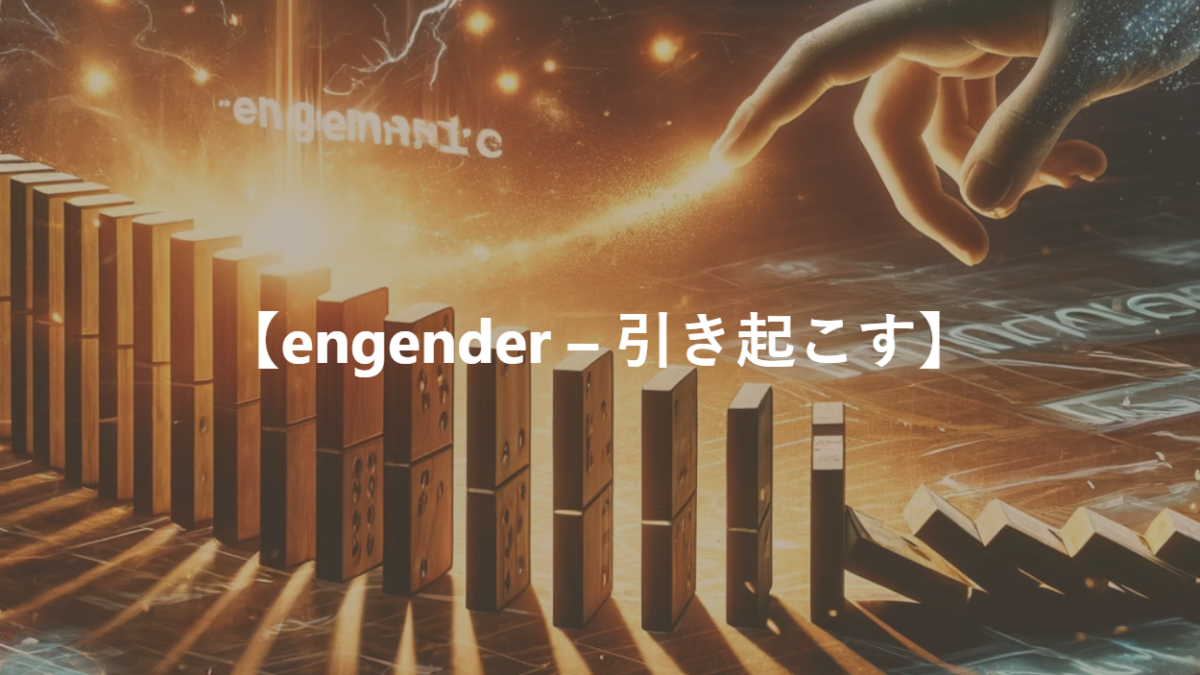語源・類義語・反対語・例文
【Engender – 引き起こす】という単語の語源とか由来を知っていますか?
“Engender”は、中英語の”engendren”や古フランス語の”engendrer”から来ており、これらはラテン語の”ingenerare”に由来します。”Ingenerare”は”in-“(内へ)と”genus”(種、起源)の組み合わせで、「生み出す」や「引き起こす」という意味があります。この語源から、”engender”は何かを生み出す、特にある状況や感情、状態を引き起こすという意味で使われるようになりました。時間が経つにつれ、”engender”は物理的な生産だけでなく、抽象的な概念や状況を生み出すことにも広く用いられるようになりました。
“Engender” originates from the Middle English “engendren” and the Old French “engendrer,” both of which stem from the Latin “ingenerare.” “Ingenerare” is a combination of “in-” (into) and “genus” (kind, origin), meaning “to produce” or “to cause.” From this etymology, “engender” has come to be used to mean generating something, especially causing a certain situation, emotion, or condition. Over time, “engender” has not only been applied to physical production but has also become widely used to refer to the generation of abstract concepts or conditions.
この単語の類義語・反対語を教えてください。
類義語
- Generate – 生成する
- Produce – 生み出す
- Cause – 原因となる
- Induce – 誘発する
- Spawn – 引き起こす、産み出す
反対語
- Prevent – 防ぐ
- Hinder – 妨げる
- Suppress – 抑制する
- Inhibit – 抑止する
- Quell – 鎮める、抑える
似た単語で間違いやすい単語はありますか?
- Generate: “Generate”も「生成する」「生み出す」という意味で、”engender”と非常に近いですが、”generate”はより技術的または物理的なプロセスを指すことが多いです。例えば、電力を生成する、データを生成するなどです。
- Produce: “Produce”は「生産する」「生み出す」という意味で、”engender”と似ていますが、”produce”は具体的な物や結果を作り出すことに重点を置く傾向があります。農産物を生産する、結果を生み出すなどの文脈でよく使用されます。
- Cause: “Cause”は「原因となる」という意味で、”engender”と同様にある事象や状態を引き起こすことを示しますが、”cause”はより直接的な原因と結果の関係を指すことが多いです。
- Induce: “Induce”は「誘発する」「引き起こす」という意味で、医学や科学の分野でよく使用されます。”engender”と似ていますが、”induce”は特定の条件下で意図的にある反応や状態を引き起こすことを指すことが多いです。
- Spawn: “Spawn”は特に生物が卵を産む意味で使用されますが、転じて「引き起こす」「生み出す」という意味で使われることもあります。”engender”と似た使い方ができますが、”spawn”は元々の生物学的な意味合いが強く、また新しいアイデアやトレンドなどが生じる文脈で使われることが多いです。
例文をいくつか教えてください
Poor communication can engender misunderstandings within the team.
不十分なコミュニケーションはチーム内での誤解を引き起こすことがあります。
The government’s new policy is expected to engender positive changes in the economy.
政府の新しい政策は経済に良い変化を引き起こすと期待されています。
The novel’s unique setting engenders a sense of mystery and intrigue.
この小説のユニークな設定は、謎と興味を引き起こします。
Her inspiring speech engendered a new wave of enthusiasm among the students.
彼女の感動的なスピーチは、学生たちの間に新たな熱意を引き起こしました。
The artist’s controversial work has engendered much debate and discussion.
そのアーティストの物議を醸す作品は、多くの議論と討論を引き起こしています。
【engender – 引き起こす】のコロケーション
- Engender trust (信頼を引き起こす): 行動や状況が他者に信頼感を与え、関係の信頼性を高めることを意味します。
- Engender controversy (論争を引き起こす): 何かが議論や論争を生み出す状況を示します。この表現は、物議を醸すトピックや意見が公にされた時に使用されます。
- Engender change (変化を引き起こす): ある事象や行動が変化や進化を促すことを意味します。社会的、経済的、または個人的なレベルでの変化を含みます。
- Engender confusion (混乱を引き起こす): 状況や情報が明瞭さを欠き、人々の間に混乱や不確実性を生み出すことを指します。
- Engender enthusiasm (熱意を引き起こす): 何かが人々の中で熱意や興奮を引き出すことを示します。これは、新しいアイデア、イベント、またはプロジェクトに対するポジティブな反応を表します。
「Engender」は、ある行為や事象が特定の結果や反応を引き起こすことを示す動詞です。以下に、「engender」が用いられる一般的なシチュエーションとそのコロケーションを紹介します。
まず、「Engender trust」は、人々の間で信頼を生み出す行動や状況を指します。この表現は、人々がお互いに対して感じる信頼感を増強するような行動を取る時に使われます。
次に、「Engender controversy」は、公開された意見やトピックが大きな議論や論争を引き起こす状況を表します。これは、意見が分かれるような話題や、物議を醸す発言がなされた場合に使用されることがあります。
「Engender change」は、何かが変化または進化を促すときに使われます。これは、新しい政策、イノベーション、または行動が社会的、経済的、個人的なレベルで変化を引き起こす場合を指します。
「Engender confusion」は、情報の不明瞭さや誤解が人々の間で混乱を引き起こす状況を意味します。これは、不十分なコミュニケーションや矛盾する情報が原因で使われることが多いです。
最後に、「Engender enthusiasm」は、何かが人々の中で熱意や興奮を生み出す状況を示します。これは、新しいアイデア、イベント、プロジェクトに対する前向きな反応が期待される時に特に使用されます。
これらの例から、「engender」がどのように様々な反応や結果を生み出す原因を表現するのに役立つかがわかります。この単語は、ある状況や行動が特定の影響を引き起こす際に特に用いられます。
The verb “engender” denotes the act or situation where certain behaviors or events trigger specific outcomes or reactions. Below, we introduce typical situations and collocations where “engender” is used.
Firstly, “Engender trust” refers to actions or situations that generate trust among people. This expression is used when actions are taken that enhance the feeling of trust between individuals.
Next, “Engender controversy” describes situations where publicly expressed opinions or topics cause significant debate or dispute. This is often used in cases where divisive topics are discussed or controversial statements are made.
“Engender change” is used when something promotes change or evolution. This refers to cases where new policies, innovations, or actions induce changes at social, economic, or personal levels.
“Engender confusion” means situations where lack of clarity or misunderstandings cause confusion among people. This is typically due to insufficient communication or contradictory information.
Lastly, “Engender enthusiasm” indicates situations where something arouses enthusiasm or excitement among people. This is particularly used when positive responses are anticipated towards new ideas, events, or projects.
From these examples, we can see how “engender” effectively conveys the cause of various reactions or results. The word is especially used when describing how a particular situation or action leads to specific effects.
文章問題
問題1
Choose the correct word to complete the sentence.
“The controversial decision __ a lot of debate among the community.”
(A) engendered
(B) created
(C) developed
(D) started
解答1
(A) engendered
解説1
この文では「その論争的な決定がコミュニティの間で多くの議論を引き起こした」という意味を表しています。”engendered” は「引き起こす」という意味で、文脈に最も適しています。他の選択肢も意味は通じますが、”engendered” が最も適切です。
問題2
Select the word that best fits the sentence.
“The new policy __ significant changes in the company’s structure.”
(A) engendered
(B) introduced
(C) caused
(D) implemented
解答2
(A) engendered
解説2
この文では「新しい政策が会社の構造に大きな変化を引き起こした」という意味です。”engendered” は「引き起こす」という意味で、文脈に最も適しています。他の選択肢も意味は通じますが、”engendered” が最も適切です。
問題3
Fill in the blank with the correct word.
“The leader’s speech __ a sense of unity among the members.”
(A) engendered
(B) fostered
(C) inspired
(D) promoted
解答3
(A) engendered
解説3
この文では「リーダーの演説がメンバーの間に一体感を引き起こした」という意味を表しています。”engendered” は「引き起こす」という意味で、文脈に最も適しています。他の選択肢も意味は通じますが、”engendered” が最も適切です。
問題4
Choose the correct option to complete the sentence.
“The changes in the law are likely to __ a shift in public opinion.”
(A) engender
(B) initiate
(C) stimulate
(D) activate
解答4
(A) engender
解説4
この文では「法律の変更が世論の変化を引き起こす可能性が高い」という意味です。”engender” は「引き起こす」という意味で、文脈に最も適しています。他の選択肢も意味は通じますが、”engender” が最も適切です。
問題5
Complete the sentence with the appropriate word.
“The report’s findings will __ further research into the subject.”
(A) engender
(B) necessitate
(C) provoke
(D) encourage
解答5
(A) engender
解説5
この文では「その報告書の発見がそのテーマに関するさらなる研究を引き起こすだろう」という意味を表しています。”engender” は「引き起こす」という意味で、文脈に最も適しています。他の選択肢も意味は通じますが、”engender” が最も適切です。

